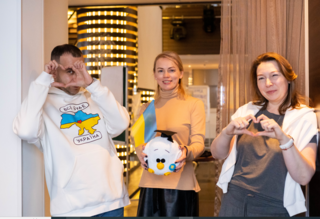Trauma
Reflections of a Trauma Therapist in the Russo-Ukraine War
We have witnessed courage, optimism, hope and our common humanity during war.
Posted December 1, 2022 Reviewed by Lybi Ma
Key points
- Our common humanity inspires us to continue to support our Ukrainian colleagues.
- The human toll of the Ukrainian war challenges civilians with the loss of electricity, water, and heat.
- The stresses and tensions of the holiday season can be eased by strategies to boost well-being.
It has been nine months since the Trauma Resource Institute (TRI) began its Ukrainian Humanitarian Resiliency Project, responding weekly to civilians impacted by the war in Ukraine. In the first days, we provided support meetings daily, then moved to three times per week, and now we meet one day per week. Volunteer trauma therapists and Community Resiliency Model Teachers from various backgrounds from different parts of the world have joined TRI staff. We started as strangers wanting to help, and now we have created a community of beloved friends and colleagues. Our common humanity has inspired us.
We have witnessed Ukrainian courage, optimism, despair, and hope. We have cried and laughed together. We continue to respond to the scores of questions posed by Ukrainian teachers, parents, and community members. Ideas have been shared from a wide variety of perspectives.
Zooming in and out of War
It is an unusual experience zooming into a space where people you care about are faced daily with losing their life or being physically and sexually violated because of war; when we click “Leave Meeting” we are back in our safe community in the U.S. The wake of our support stays with us as we hear reports from Ukraine that there is no electricity, water, or heat because of the Russian shellings. Our friends and colleagues remain in our hearts as they struggle to keep warm, stay connected to family and friends, and find life-preserving water for their families.
Our Ukrainian colleagues sent us overarching comments and questions about the reality of life now as the holiday season is starting. They said, “Many people already doubt the legitimacy of celebrations, as the Ukrainian military continues being killed on the frontline, and millions are striving without electricity, water supply, and heating. Many feel guilty about not 'deserving’ the celebrations until the war ends." How do we deal with all that additional stress and tension that arise over the proximity of the holiday season?
Strategies to Boost Well-Being

Many of us grapple with the additional stresses surrounding the holidays, even if not facing the circumstances of war. The heartwarming responses of our Ukrainian colleagues and the thoughts of our TRI staff and volunteers can guide us as the holidays approach.
1. Engage in self-care practices such as meditation and prayer, listening to music, moving by walking or dancing, and writing in a journal about your feelings and reflections.
2. Creating spaces within families to express grief. The traditions of our faith and community can be helpful to soothe the heart and the mind.
3. Although maintaining the same traditional practices may be difficult, especially for those that require electricity, there may be ceremonial lighting of candles inherent within many faiths. Continuing with traditions can remind us of our personal and familial strengths.
4. Remember the people and experiences that have uplifted us in our lives, giving us strength, and those who have been generous and kind.
5. The power of human connection replenishes us, and as we continue to share our love for each other, remember the common humanity that binds us.
Anna's Story of Resiliency
Anna, one of the leaders of EdCamp Ukraine, has been present for most of our support meetings over the last nine months. In the last few weeks, she has returned to Kharkiv to care for her ailing mother in the hospital. She lives in a beloved city of Ukraine without electricity, not even in the hospital caring for her mother. Her courage, strength, and love are contagious. She shared with us what else is true. She reflected on her ancestors who lived and survived World War I and II, the great famine of Ukraine, and the Stalin regime, and now she and her daughter face the current Russian invasion. She feels the embodied strength of her ancestors. She exclaims I have the DNA of my ancestors, and I will continue with hope, embracing our country and all whom we love.


